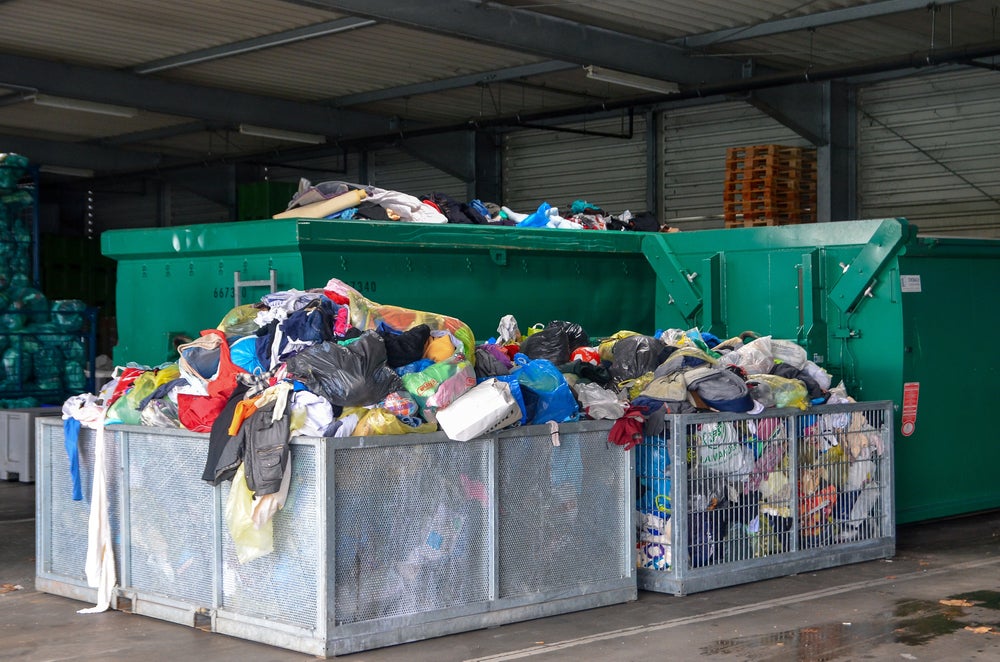Credit: Shutterstock.
Campaign group Greenpeace placed the items, tagged with tracking devices, at 11 containers located on public roads and in Zara and Mango stores across different areas in Spain between July and August. The items donated were used but still in good condition.
After four months of monitoring, a Greenpeace report claims that some of the garments donated in Spain travelled thousands of miles, with some items arriving in the United Arab Emirates, others in Egypt, Togo, Chile and Morocco.
Greenpeace also noted that clothing donated in the two stores followed a similar route as clothing donated in public recycling bins.
Around half of the items tracked did not leave Spain, although they did move location several times. Greenpeace believes that these items have not yet arrived at their final destination.
One of the donated items was tracked to Bulgaria, before being sent on to Romania, where it was sold in a second-hand store.
One of the items donated at a Mango store in Barcelona travelled to Valencia before ending its journey at a waste plant in Almeria. Greenpeace says it is impossible to tell whether the garment or tracker alone ended up at the site.
Access the most comprehensive Company Profiles
on the market, powered by GlobalData. Save hours of research. Gain competitive edge.

Company Profile – free
sample
Your download email will arrive shortly
We are confident about the
unique
quality of our Company Profiles. However, we want you to make the most
beneficial
decision for your business, so we offer a free sample that you can download by
submitting the below form
By GlobalData
Five items were tracked to the United Arab Emirates, including three that were tracked to the Hamriyah Free zone in Sharkah, where several companies that import and export used clothing and textile waste are based. One of these items was later tracked in Egypt, suggesting that some of these may have been re-exported.
Four items were tracked to Pakistan – two were found in the Karachi Export Processing Zone, where several textile waste companies are based, and two were tracked in an area near the Lyari River, where several used clothing businesses are based. Greenpeace claims that piles of textile waste accumulate in the area.
One item was tracked in Santiago, Chile, in the Chilean branch of a Spanish used clothing company. Greenpeace claims that the country is known to struggle with textile waste, with piles of used garments accumulating in the Atacama Desert.
The European Environment Agency estimates that 46% of used textiles exported in the EU arrive in African countries, where around 60% are resold and the rest is discarded.
Greenpeace has kept the live tracking of all the devices placed on garments live on its website to track any further movements.
A previous Greenpeace report, shared in May 2022, claimed that most of the clothing sent to East Africa is sent straight to landfill.
Greenpeace claims that used clothing sent from Spain into other European countries usually has a higher value than that sent to Morocco, the United Arab Emirates or Pakistan – which are the main destinations for these exports. It argues that these lower value exports indicate that the clothing sent to these countries is of poorer quality, reducing the possibility of a second life and increasing the risk of environmental harm when it is discarded.
Sara del Rio, a researcher at Greenpeace who led on this investigation, said: “We have been able to verify that the management of clothing that is deposited in containers is far from the circular economy they seek. The current model requires countries from the global south to produce clothing and then manage the waste generated when it is discarded, traveling thousands of kilometres.”
Greenpeace said its research shows clothing production needs to be “radically changed” to prevent “false solutions” such as the clothing recycling schemes it investigated. Del Rio added: “As long as this does not change, the second life of clothing will be more of an industry strategy so that we continue buying clothes without regrets on days like Black Friday than a reality.”
Mango and Zara were two of the 30 fashion brands banned from pre-loved platform Vestiaire Collective banned from its platform in November 2023, as part of a wider three-year plan to stop selling fast fashion items altogether and tackle the industry’s waste problem.
Neither Mango nor Inditex‘s Zara had responded to Just Style’s request for comment at the time of going to press.


